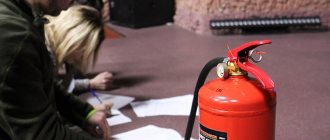ST 219 of the Criminal Code of the Russian Federation.
1. Violation of fire safety requirements, committed by a person who had a duty to comply with them, if this entailed through negligence the infliction of serious harm to human health, is punishable by a fine in the amount of up to eighty thousand rubles or in the amount of the wages or other income of the convicted person for a period up to six months, or restriction of freedom for a term of up to three years, or forced labor for a term of up to three years with deprivation of the right to hold certain positions or engage in certain activities for a term of up to three years or without it, or imprisonment for a term of up to three years with deprivation of the right hold certain positions or engage in certain activities for a period of up to three years or without it.
2. The same act, which through negligence resulted in the death of a person, is punishable by forced labor for a term of up to five years with deprivation of the right to hold certain positions or engage in certain activities for a term of up to three years or without it, or imprisonment for a term of up to five years with deprivation of the right hold certain positions or engage in certain activities for a period of up to three years or without it.
3. An act provided for in the first part of this article, resulting in the death of two or more persons through negligence, is punishable by forced labor for a term of up to five years with deprivation of the right to hold certain positions or engage in certain activities for a term of up to three years or without it, or by imprisonment for up to five years. for a term of up to seven years with or without deprivation of the right to hold certain positions or engage in certain activities for a period of up to three years.
Commentary to Art. 219 Criminal Code
1. The objective side is characterized by an act in the form of action or inaction, constituting a violation of the current fire safety rules, defined by Federal Law of November 18, 1994 N 69-FZ “On Fire Safety”, Fire Safety Rules in the Russian Federation (PPB 01-03), approved by Order of the Ministry of Emergency Situations of Russia dated June 18, 2003 N 313, and other regulatory legal acts. The signs of the objective side are also explained in Resolution of the Plenum of the Supreme Court of the Russian Federation dated June 5, 2002 No. 14 “On judicial practice in cases of violation of fire safety rules, destruction or damage to property by arson or as a result of careless handling of fire.”
2. The crime is completed from the moment of causing serious harm to a person’s health.
Bibliography
- Fazylov R.R. Current issues of criminal liability for violation of fire safety requirements // Current problems of economics and law. 2010. No. 2 (14). pp. 175 – 178.
- Tokmantsev D.V. On the issue of the concept of corpus delicti // Central Scientific Bulletin. 2022. T. 3. No. 2 (43). pp. 72-73.
- Garmashev Ya.V. Problems of qualification of objective signs of violations of fire safety rules // BGUEP Publishing House. 2011. pp. 13 – 19.
- Rospravosudie [Electronic resource]. – Access mode: https://rospravosudie.com/court-dobrinskij-rajonnyj-sud-lipeckaya-oblast-s/act-502115111/ (date of access: 04/21/18).
- Criminal law. Special part: textbook for universities / resp. ed. AND I. Kozachenko, Z.A. Neznamova, G.P. Novoselova. – 3rd ed., rev. and additional – M., 2007. – 341 p.
Second commentary to Art. 219 of the Criminal Code of the Russian Federation
1. The victim can be any person.
2. The objective side is expressed in violation of rules ensuring fire safety. For example, the absence or malfunction of the necessary fire extinguishing equipment (for example, fire extinguishers) during a fire, leaving electrical equipment unattended, firing stoves with the door open, blocking passages with flammable waste, etc.
Criminal liability for violation of fire safety rules is possible only in the event of socially dangerous consequences - causing serious harm to health. A causal connection must be established between the act committed and the consequences that occurred.
3. From the subjective side, the crime is characterized by a careless form of guilt.
4. The subject of the crime is the person who was entrusted with the obligation to comply with fire safety rules or ensure their compliance in certain areas of work; property owners, as well as persons authorized to own, use and dispose of property (including tenants, tenants, etc.).
5. A qualified type (Part 2 of Article 219) of violations of fire safety rules is causing the death of a person through negligence, and a particularly qualified type (Part 3 of Article 219) is the death of two or more persons.
If a fire occurs as a result of violation of safety rules at nuclear power facilities, explosive facilities, etc. responsibility comes under Art. 215, 216, 217, 218 of the Criminal Code, etc. without additional qualification under Art. 219 CC.
Verdict under Part 3 of Art. 219 of the Criminal Code of the Russian Federation.
PRI G O V O R
In the name of the Russian Federation
Aban village April 24, 2012
Judge of the Abansky District Court of the Krasnoyarsk Territory Kizilova N.V.,
with the participation of the state prosecutor - senior assistant prosecutor <address> Sh.,
defendant I.,
defender Eremina O.S., who presented the certificate and warrant,
representative of victims M.,
under the secretary Udodova Yu.V.,
Having examined the materials of the criminal case No. in relation to: I., born DD.MM.YYYY in the village of Beloyarsk, <address>, citizen of the Russian Federation, not liable for military service, having a 9th grade education, widow, unemployed, living at the address: village Vorobyovka, <address>, no previous convictions,
accused of committing a crime under Part 3 of Article 219 of the Criminal Code of the Russian Federation,
INSTALLED:
DD.MM.YYYY I., on the basis of an oral agreement, rented from R. a house located at <address> No. at <address>, and therefore, being a tenant, she had the authority to use the specified residential building.
In accordance with Article 34 of Federal Law No. dated DD.MM.YYYY Goal “On Fire Safety”, citizens are required to comply with fire safety requirements. According to Article 38 of the said Federal Law, persons authorized to use property are responsible for violation of fire safety requirements, and paragraph 1 of the Fire Safety Rules in the Russian Federation (PPB 01-03) citizens of the Russian Federation are charged with compliance with fire safety requirements. I., living in the house at the specified address as a tenant of a residential building, was obliged to comply with fire safety requirements and bear responsibility for their violation.
DD.MM.YYYY I., living with young children I., DD.MM.YYYY year of birth, and I., DD.MM.YYYY year of birth, at <address>, located at <address> in < address>, and being a tenant of this residential premises, in violation of clause 70 of the Fire Safety Rules (PPB 01-03), approved by Order of the Ministry of Emergency Situations of the Russian Federation No. dated DD.MM.YYYY, according to which, when operating stove heating, it is prohibited to allow the stove to overheat by placing it in a red-hot wood stove and knowing that the house uses faulty stove equipment, built into the stove located in the room of the house, the oven has metal burnouts, she took the duties assigned to it to comply with fire safety requirements lightly and, anticipating the possibility of socially dangerous consequences , in the form of a house fire, and the possible death of young children in the home, without sufficient grounds, arrogantly, she hung a cotton duvet cover on the stove, above the oven, in a room of the house, to dry. In violation of clause 70 of the Fire Safety Rules (PPB 01-03), approved by Order of the Ministry of Emergency Situations of the Russian Federation No. dated DD.MM.YYYY, according to which, when operating stove heating, it is prohibited to leave burning stoves unattended, as well as to entrust supervision of them to young children, AND ., leaving her young children I. in the house, I. under the supervision of a visiting minor S., who is disabled since childhood, left the stove burning in the house without personal supervision, entrusting minor S. with supervision of the burning stove, left around 12 :00 hours DD.MM.YYYY from home to visit his friend. As a result of violations of fire safety rules (PPB 01-03) committed by I., approved by Order of the Ministry of Emergency Situations of the Russian Federation No. dated DD.MM.YYYY, at about 14:00 hours DD.MM.YYYY, a thermal fire occurred in the room of the specified house due to overheating of the stove spontaneous combustion of a cotton duvet cover hanging on the stove, which was located in close proximity to part of the overheated heating stove, and fire of the interior of the <address> in <address>, as a result of which the interior of the house was damaged.
During the fire, minor I. was injured in the form of thermal injury, accompanied by the presence of extensive thermal burns of the 3rd degree (stages 3a and 3b), 70% of the skin area - in the face, torso, upper and lower extremities, with signs of burns upper respiratory tract (according to clinical data), with symptoms of burn shock 3 degrees, coma 2-3 degrees (according to clinical data). I.’s death was confirmed in the hospital DD.MM.YYYY at 19:50. This thermal injury is included in the criteria that characterize the qualifying feature: harm dangerous to human life, according to the specified criterion, according to the rules of “Determining the severity of harm caused to human health,” is qualified as serious harm to health; consists of a direct causal connection with the occurrence of death. These injuries occurred shortly before death, from exposure to high temperature, flames, or fire conditions. Juvenile I. suffered physical injuries in the form of thermal injury, accompanied by thermal burns with flames of the 3rd degree (stages 3a and 3b), with a total area of 40%, in the head, torso, upper and lower extremities, burn of the upper respiratory tract with symptoms of edema and narrowing of the glottis; burn shock of the 3rd degree, which is confirmed by clinical observation of the patient in the hospital, data from morphological and histological examination. Death was confirmed in the hospital DD.MM.YYYY at 05:45. This thermal injury, with thermal flame burns of the 3rd degree (stages 3a and 3b), with a total area of 40%, with a burn of the upper respiratory tract with symptoms of swelling and narrowing of the glottis, burn shock of the 2nd-3rd degree, characterizing the qualifying sign: life-threatening harm a person, based on the specified criteria, is classified as serious harm to health; consists of a direct cause-and-effect relationship with the occurrence of death. These injuries occurred shortly before admission to the hospital, from exposure to high temperature, flames, and fire conditions. The existing signs in the form of the presence of soot in the upper respiratory tract are signs of the child’s lifetime exposure to fire conditions.
Tenant I.'s violation of fire safety rules has a direct and causal connection with the resulting consequences in the form of causing the death of minors I. and I.
Defendant I. declared her agreement with the charges, admitted her guilt in full as charged and supported her petition, stated at the preliminary investigation, for a verdict to be passed without a trial. She submitted this petition voluntarily and after consultation with defense attorney Eremina O.S. She understands what the essence of the special order of judicial proceedings is, and what its procedural consequences are.
State prosecutor Sh., the representative of the victim M., in court expressed their consent to the verdict without a trial.
The court comes to the conclusion that the accusation, which defendant I. agreed with, is justified, confirmed by the evidence collected in the criminal case.
The court qualifies I.’s actions under Part 3 of Article 219 of the Criminal Code of the Russian Federation as a violation of fire safety requirements, committed by a person who had the responsibility to comply with them, resulting in the death of two persons through negligence.
According to the conclusions of the forensic psychiatric commission of experts No. from DD.MM.YYYY I., he shows signs of mild mental retardation with mild behavioral disorders. I. does not need to apply compulsory medical measures to her in accordance with Article 97 of the Criminal Code of the Russian Federation (case sheet 198-200).
The court finds the doctors' conclusions correct, since they correspond to the case materials, information about the defendant's personality, and are convincingly argued. The defendant herself does not dispute the correctness of the commission’s doctors’ conclusions.
Since defendant I. fully admitted her guilt, repented of what she had done, is aware of the nature and consequences of her petition, the punishment for the crime committed by the defendant, provided for in Part 3 of Article 219 of the Criminal Code of the Russian Federation, does not exceed 10 years in prison, there are grounds for applying a special procedure for accepting court decision in the case in accordance with Articles 314-316 of the Code of Criminal Procedure of the Russian Federation.
When determining the type and amount of punishment for defendant I., the court takes into account: the nature and degree of public danger of the crime she committed, information about her personality, satisfactory characteristics at the place of residence, the fact that the crime was committed by her for the first time and belongs to the category of crimes committed by negligence, in including circumstances mitigating the punishment, the impact of the imposed punishment on the correction of the convicted person, as well as the state of her mental health.
As circumstances mitigating I.'s punishment, the court takes into account the admission of guilt, sincere repentance for what she did, and the mental state of her health.
The court did not establish any circumstances aggravating I.'s punishment.
Taking into account the above circumstances, as well as the fact that only imprisonment fully meets the goals of restoring justice, as well as the goals of correcting the defendant, the court believes that the defendant’s punishment should be imposed only in the form of imprisonment, with the sentence being served in accordance with paragraph “A” part 1 of article 58 of the Criminal Code of the Russian Federation in a colony-settlement.
Considering the issue of imposing an additional punishment provided for in Part 3 of Article 219 of the Criminal Code of the Russian Federation, the court finds no grounds for imposing an additional punishment on I. in the form of deprivation of the right to hold certain positions or engage in certain activities.
Taking into account the actual circumstances of the crime and the degree of its public danger, the court finds no grounds for changing the category of the crime to a less serious one as provided for in Part 6 of Article 15 of the Criminal Code of the Russian Federation.
Physical evidence: the meter stored in the criminal case should be returned to the owner R. according to its ownership.
Based on the above and guided by Article 316 of the Code of Criminal Procedure of the Russian Federation, the court
SENTENCED:
Find I. guilty of committing a crime under Part 3 of Article 219 of the Criminal Code of the Russian Federation and, on the basis of this article, sentence her to imprisonment for a period of 2 years 6 months without deprivation of the right to hold certain positions or engage in certain activities while serving the sentence in a colony -settlement, with independent travel to the place of serving the sentence.
The term of serving the sentence is calculated from the day of arrival in the colony-settlement.
The preventive measure for I. in the form of a written undertaking not to leave the place and proper behavior until the sentence enters into legal force is left unchanged.
Physical evidence: the meter stored in the criminal case must be returned to the owner R.
The verdict can be appealed in cassation to the court within 10 days from the date of its proclamation in compliance with the requirements of Article 317 of the Code of Criminal Procedure of the Russian Federation, by filing a complaint through the Abansky District Court.
If a cassation appeal is filed, the convicted person has the right to petition for his participation in the consideration of the criminal case by the court of cassation.
Presiding
Who is responsible
Since apartment buildings are considered objects of increased fire hazard, the list of responsible persons will be quite wide. In accordance with the current rules of law in the field of regulation of the operation of multi-apartment residential buildings, the list of persons who are responsible for compliance with fire safety rules in such buildings is as follows:
- owners of residential and non-residential premises in apartment buildings. They are directly responsible for compliance with fire safety rules as part of the implementation of various types of operational activities of their real estate and property located on the territory of such premises. When operating such premises, regardless of whether they are residential or non-residential, the owners are obliged to comply with all fire safety measures that will ensure a safe existence for all persons living in such an apartment building;
- The head of the organization managing common property in an apartment building, regardless of the type of such organization (management company, partnership of real estate or housing owners), is responsible for compliance with fire safety rules in relation to common property, the management of which is entrusted to one or another organization. If a management organization has several houses under management, then a responsible person from the staff of such management organization is assigned to each house. Several houses may be assigned to one responsible person (depending on the number of such responsible persons and the number of houses managed by a particular organization);
- representatives of the owners of premises in an apartment building. As a rule, such representatives include those in charge of the house, at the entrance, elected at a meeting of the owners of the premises in such a house.
Each of these responsible persons is assigned their own powers to ensure fire safety measures. If such powers are not fulfilled, administrative penalties are imposed on those responsible for compliance with fire safety rules in accordance with the provisions of the articles of the Code of Administrative Offenses, and orders are also given to eliminate the identified violations.
Examples from judicial practice
Severe consequences after fires resulting from neglect of fire safety rules are a very common occurrence. Let's give two examples.
Did you know
According to official statistics, in the period January-June 2017 alone, there were more than 64 thousand fires in Russia. Among the main reasons are careless handling of fire and violation of the rules for the design and operation of electrical equipment and household appliances.
Example one
Gr. Petrova used a faulty household electrical extension cord. Having connected an electric heater to it, she left the house to go to the store. When I returned, I found a fire in the apartment and a strong acrid smell of burning plastic. The fire was just starting, the electrical plugs were knocked out, so she managed to put out the fire on her own before the firefighters arrived. Smoke entered the apartment above through the ventilation holes. The result was carbon monoxide poisoning. Sidorova, who lives there. The damage to health was determined by a forensic examination to be of moderate severity. To gr. Petrova, in accordance with Art. 20.4 of the Code of Administrative Offenses of the Russian Federation, punishment was applied in the form of a fine in the amount of 5,000 rubles.
Example two
Individual entrepreneur Ivanov, while carrying out renovation work in an apartment purchased for furnishing a store, located on the ground floor of a residential building, neglected the PBB. He carried out welding work near paint and varnish products purchased for sale. The result was a fire that quickly grew into a major fire. As a result of this fire, serious harm was caused to the resident of the apartment located above the store. The court awarded gr. Ivanov is punished under Art. 219, part 1 of the Criminal Code in the form of imprisonment for 2 years.
Want more information? Ask questions in the comments



